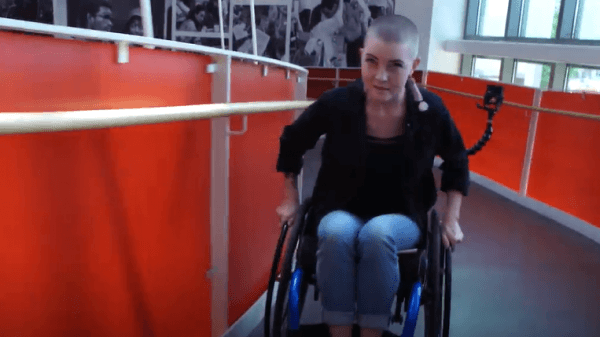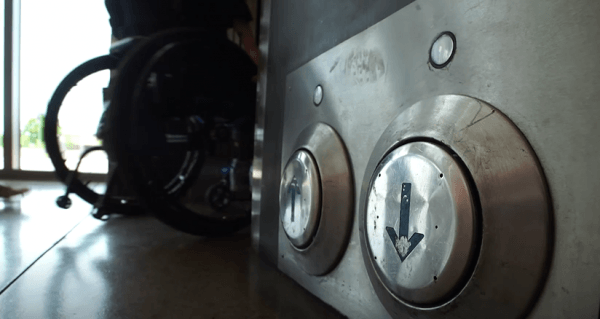I think that most of us would agree that there is a clear-cut difference between disabilities limiting people’s access to the world at-large and active discrimination towards them. However, that is apparently not the case. According to the Pew Research group, there are approximately forty million Americans with a disability, roughly 12.6 percent of our population. While these individuals run the gamut from ailments that are simply annoying all the way to completely incapacitating, that is still a significant portion of the populace.
The subject of today’s article sits in the middle of this pack. Her name is Ace Ratcliff. From a video on Facebook, she states, “I am a disability justice advocate. I started having chronic pain when I was 19, and we didn’t know why my back was dislocating. It turns out that it was Ehlers-Danlos Syndrome which is a collagen disorder and the main symptom that happens is my joints dislocate very, very easily.” To add insult to injury, she also lost a portion of her hearing during a surgery to her jaw several years ago.
Her disability, obviously, severely limits her ability to live the same life that most of us enjoy. Things like stairs or even uneven sidewalks are nothing more than a minor inconvenience for most of the population, but for Ace they can pose major issues. “If I go out, it doesn’t matter what I am doing, I will run into some kind of problem.” Through her social media outreach, she ended up linking up with Alex Koren, founder of Actiview. Alex saw Ace after she posted a video outside of an AMC where the closed caption device the theater was using (called Dolby CaptiView) wasn’t properly working. Actiview is a company that has created an app that allows those with sensory disabilities to be able to enjoy movies. It will amplify the audio, translate, add audio descriptions for those who are blind, has closed-captioning, and even has sign language.
When I see organizations like this I truly feel inspired. They identified a need that affects the quality of life of millions and took active steps to not only better their lives but do so in a way that allows them to enjoy some of the same diversions we take for granted. For this I salute them and all of those that spend each day trying to better the lives of those around them who are not blessed with the same physical abilities.
What does any of this have to do with discrimination and special rights? Here is where we once again come back to Ace. See, there was more to her posts than just educating others on her disabilities and the effects they have on her life. Ace looks at the world as being against her because of her disability. When she was outside of the AMC theater she stated, “Well guess what? I got more passes because the CaptiView wasn’t working again…I want to be treated with the same importance that your nondisabled guests are treated with.”

Here is where I feel compelled to break away from her view of the world. This does not in anyway mean I do not empathize with her frustration that the devices supplied by the theater did not work. I completely understand how this can be demoralizing to her. If the theater has those devices, she should have reason to believe that they are in working order and if they are not, then she has every reason to be hurt and upset. However, I take umbrage with the belief that she is being actively discriminated against because they were not.
This is not the only statement she makes towards her belief that she deserves and is owed special treatment due to her afflictions. “It’s ok to feel discriminated against because that’s what’s happening…It’s ok to feel hurt and demoralized and broken because that’s the way you’re being treated…So many people think that the ADA passed in 1990 and so everyone just assumes, ‘Ok, well you’re good. You’ve got the ADA, so you’re covered.’ But that’s not how it works at all. You look around and you so infrequently see disabled people out in public, and there’s a reason for that. It’s because the world is still very inaccessible…The world is inaccessible. Period. Full stop. Inarguably so…Not only do I want non-disabled people to recognize that this is still a systemic level of discrimination that occurs in every aspect of our life, but I want disabled people to be heard and to be recognized and to realize that it’s ok to speak up.”
I find this entire attitude to be sad; speaks directly to the lack of respect the millennial generation has for anything other than their own needs and whims. I am not saying that America has gotten it completely right when it comes to giving those with disabilities access. Nor am I saying that people should simply “suck it up” and deal with the status quo.
We have come to a point where people believe that when the world does not work to their liking that it must be because people are biased against them. Like most Americans, Ace has no idea what true discrimination looks or feels like because she has never actually had to live in a world of true hate and disregard. I would recommend that she goes to some place like Afghanistan, North Korea, or Somalia for a bit of an education.
In essence, discrimination is defined as acting against someone due to having a bias against them. When it comes to the disabled, no one is actively attempting to keep them from being mobile in society or being able to physically interact with the world around them. Ace looks at the fact that the world is not designed for her to easily access it and immediately takes on the role of a victim. This mentality immediately sets up for an adversarial relationship between her and those she is trying to win over to her view. I see no difference between this rhetoric and calling someone a racist because they do not agree with you politically, or being sexist simply because I did not vote for Hillary Clinton.
What she and most of those who look at the world through the lens of a victim need to learn is how you present a problem is just as important, if not more so, than the actual problem itself. I am not going to chastise society because every building does not specifically cater to every person according to their individual needs. Instead of using terms like discrimination when addressing a movie theater with inoperative closed-caption equipment, let’s instead speak about reaching out to and partnering with companies like Actiview. Every officer I ever worked for always said the same thing when addressing complaints, “Don’t come to me with a problem without a solution.” It did not have to be a perfect solution, but you needed to show that you were investing thought and effort into the situation.

It is easy to complain and throw a temper tantrum about inequities. Yet to put yourself in the position of problem-solver opens you up to possible disappointment since this requires you to see other points of view and concede to potential limitations.
The difference between Ace and Alex is extreme. One looks at a problem and develops a solution which can help a wide range of people. The other looks at a problem and demands reparations. I know which one I am more likely to support both emotionally and even fiscally. This is a lesson that most young people would be good to learn. Imagine the world if everyone had to come up with a solution before they were allowed to cry and whine on social media.
















